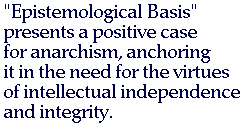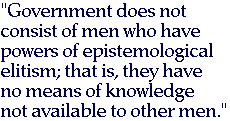www.thornwalker.com/ditch/eboa_ preface_3.htm
Roy Childs on anarchism
by Ronald N. Neff, continued
Our
Roy
Childs table
of contents
Reprint
rights
Part three
The
epistemological case
In the Open Letter, Roy had been concerned to highlight a contradiction he had found in Ayn Rand's political philosophy: that there was only one way government — the purpose of which was to defend people's rights from the initiation of force — could maintain its "monopoly on the use of force." At some point, it would have to use force against businesses that had themselves committed no crimes, specifically businesses that attempted to provide "governmental" services involving the administration of justice services. The Objectivist position required that there could be no parity between the government and such businesses: they would be answerable to it; it would not be answerable to them. This state of affairs is inherent in the concept of a government and provides the focal point of Roy's argument.
As successful as the Open Letter was in stirring up debate and making Roy an overnight celebrity in the movement, there was a lot more he had to say in defense of anarchism and it was not long before he was saying it.
Roy was one of the fastest typists I ever knew. He composed on one of the early-generation IBM Selectrics (without the correction key and tape), usually on flimsy yellow paper. I myself was later clocked at 103 words per minute on a Selectric, with three errors. Roy not only typed faster than I ever did, but he composed as he was typing. His drafts contained almost no spelling errors, no corrections, no strike-throughs, and no rewritings. (The emphatic italics in TLD's edition of "Epistemological Basis" all appear in the original. To do that on a Selectric, Roy had to replace the typing element every time he wanted to italicize something; and then he replaced it again to return to roman type.) Essays were organized as they appeared on paper. When he was writing "Anarchism & Justice," each section was written in a single, discrete burst of creativity over the months of their publication. Writers who have experience only with computer keyboards and word-processing software may not realize what a feat that was. It means that the problem with getting Roy to finish things was not getting him to sit down and actually finish them; it was getting him to sit down and start them.
"The Epistemological Basis of Anarchism," published here for the first time, is 17 pages of single-spaced elite typescript. Uncharacteristically, shortly after finishing it Roy rewrote the last page, incorporating a few minor rewordings and the addition of text. One paragraph (included in the annotations) was removed. There are only a handful of misspellings to be corrected, though a lot of punctuation changes were made. Some rewriting was necessitated by rules of grammar. In its final form, the essay was completed on November 30, 1969. (In the version published on this site, spelling, punctuation, and grammatical corrections have been made silently.)
 The theme of "Epistemological Basis" is intellectual
independence and integrity, that is, acting in a manner
consistent with one's knowledge. It builds on an
argument presented very briefly in the Open Letter and
draws not only on the major texts presenting
Objectivism's derivation of ethical principles and
rights, but also on a little essay of Rand's titled "Who is
the final authority in ethics?" [8] One reason I
am particularly happy to see "Epistemological Basis"
finally published is that, while Randian limited-state
efforts to legitimize government have often attempted
to rebut the arguments of the Open Letter, they have
failed utterly to address this more important work.
That is to be expected of an unpublished work —
even one that, according to Roy, was circulated in the
thousands — but, what is worse, in their zeal to
justify the state Randians are typically driven to
exhibit a scorn for the intellectual independence that in
other contexts they might champion.
The theme of "Epistemological Basis" is intellectual
independence and integrity, that is, acting in a manner
consistent with one's knowledge. It builds on an
argument presented very briefly in the Open Letter and
draws not only on the major texts presenting
Objectivism's derivation of ethical principles and
rights, but also on a little essay of Rand's titled "Who is
the final authority in ethics?" [8] One reason I
am particularly happy to see "Epistemological Basis"
finally published is that, while Randian limited-state
efforts to legitimize government have often attempted
to rebut the arguments of the Open Letter, they have
failed utterly to address this more important work.
That is to be expected of an unpublished work —
even one that, according to Roy, was circulated in the
thousands — but, what is worse, in their zeal to
justify the state Randians are typically driven to
exhibit a scorn for the intellectual independence that in
other contexts they might champion.
For example, Robert Bidinotto, a writer on the psychology of crime and a well-known Randian associated with the Objectivist Center, published an Objectivist attempt to rebut anarchism titled "The Contradiction in Anarchism." [9] In it, he asks "who determines ..." this; "who determines ..." that; and "who determines ..." the other thing three times. He asks "whose laws" and "whose definition" twice, and "whose morality." He calls for a "final arbiter" no fewer than five times, as well as a "final standard" and a "final determiner." Aside from the fact that his arguments for the necessity of a state are pitiably ineffectual, almost meretricious, one might think he had never heard of the virtue of intellectual independence.
The nub of the argument of the Open Letter is contained in "Epistemological Basis," but there is much more. Roy hammers away relentlessly at the ends government is to serve, showing that all its claims are, in the end, vain promises to relieve ordinary men of the necessity of relying on their own judgment and acting on it. He shows that there is no reason to suppose that any given agency would ever obtain or hold a monopoly on the use of force in a given area unless it first resorted to force. And over and over, he argues that the resort to government is nothing more than the quintessential resort to initiated force, and that that resort to force simply cannot be justified, the conceptual acrobatics of critics of the Open Letter notwithstanding.
Unlike all Roy's other efforts on this subject, then, "The
Epistemological Basis of Anarchism" presents a
positive case for anarchism, anchoring it in the need
for the virtues of intellectual independence and
integrity.
Public
debate
At a libertarian conference held in New York in early
1971, Roy debated Jeffrey St. John on free-market
anarchism (or as it was called then,
"anarcho-capitalism") vs. limited government. SIL, one of the
sponsors of the conference, recorded the debate and
made the tape available the following September. When
Kephart purchased SIL's book service, he acquired
rights to the tape and included it as part of his Audio
Forum enterprise. [Listen to the debate, "Anarchism vs. Limited Government: A Debate — R. A. Childs vs. Jeffrey St. John."] [10]
St. John was known in Objectivist circles from a couple of articles he had published in The Objectivist, an honor not many outside Rand's immediate circle ever enjoyed. Limited-state libertarians had good reason to expect much from him and to hope that he would refute the noxious arguments of anarchism. They were to be greatly disappointed.
 St. John evinced a familiarity with both the Open Letter
and the "Epistemological Basis," but never once in the
debate did he actually address Roy's arguments. I do
not mean that in my opinion he failed to refute them; I
mean literally that he did not address them. When,
during the question period, he was called on to attempt
to refute the logic of Roy's argument, he could assert
only that under a Randian limited government there
would be no cause for anyone to become dissatisfied
with the defense services of the government, and
therefore there would be no need for competing defense
agencies even to exist; hence no competing agency
would come to the attention of the government; hence
government would never have to make the choice that
Roy had argued would make it a violator of rights.
St. John evinced a familiarity with both the Open Letter
and the "Epistemological Basis," but never once in the
debate did he actually address Roy's arguments. I do
not mean that in my opinion he failed to refute them; I
mean literally that he did not address them. When,
during the question period, he was called on to attempt
to refute the logic of Roy's argument, he could assert
only that under a Randian limited government there
would be no cause for anyone to become dissatisfied
with the defense services of the government, and
therefore there would be no need for competing defense
agencies even to exist; hence no competing agency
would come to the attention of the government; hence
government would never have to make the choice that
Roy had argued would make it a violator of rights.
Roy did not draw heavily on his epistemological arguments in this engagement. However, when he took up an argument of St. John's concerning objective law, he uttered what is perhaps the least understood principle in the case against the legitimacy of government: "Government does not consist of men who have powers of epistemological elitism; that is, they have no means of knowledge not available to other men."
It should be noted that Roy made a point in the debate that he had made only inchoately in the "Epistemological Basis" and nowhere else in his writings. It is related to the nature of agency: "In a social context the only geographical area that is important is an individual's property." He later folded this principle into his discussion of the right of property as the foundation of the concept of agency when he criticized the notion of a government as the supposed agent of those whose will it no longer represented or never represented.
Posted 2003 by WTM Enterprises.
© 2003 by Ronald N. Neff. All rights
reserved by author.
Notice to visitors who came straight to this document from off site: You are deep in The Last Ditch. You should investigate our home page and table of contents.